Fire Breaks Out On Panama-Flagged Tanker Off Southern Iran Coast

A fire has erupted on a Panama-flagged tanker carrying 40,000 tons of LPG off the southern coast of Assalouyeh, Iran.

A fire has erupted on a Panama-flagged tanker carrying 40,000 tons of LPG off the southern coast of Assalouyeh, Iran.
Port authorities have successfully rescued 22 sailors, but the blaze has spread across multiple sections of the vessel, prompting immediate containment efforts.
In May, Iran seized two oil tankers – one Panama-flagged and one Marshal Islands-flagged within one week in Persian Gulf waters, marking an escalation in a series of attacks on commercial vessels since 2019.
The US Navy reported that the Panama-flagged oil tanker Niovi was seized by Iran's Islamic Revolutionary Guard Corps Navy (IRGCN) while navigating the narrow Strait of Hormuz.
These events underscore the persistent maritime security concerns in the region, where heightened military activity and geopolitical tensions have cast significant threats upon commercial vessels.
In response to these dynamics, over 3,000 US sailors and marines from the Bataan Amphibious Ready Group (ARG) and 26th Marine Expeditionary Unit (MEU) have been deployed to the Middle East. This robust deployment serves to address escalating tensions between the US and Iran and projects US maritime strength in the face of Iran's aggressive actions, including their recent unveiling of new maritime weaponry.
The ongoing deployment, encompassing vital waterways like the Strait of Hormuz, Red Sea, Suez Canal, and Strait of Bab el-Mandeb, highlights the US Navy's steadfast commitment to securing critical choke points and reinforcing alliances in a complex and challenging geopolitical environment.
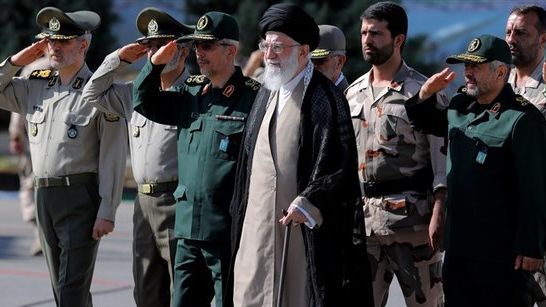
Politicians, diplomats, opposition leaders and activists convened Thursday to urge the UK and EU nations to designate Iran's Revolutionary Guards Corps (IRGC).
During a roundtable online conference hosted by The Jerusalem Center for Public Affairs, speakers gave passionate calls for a galvanization in the international fight against the dangerous military arm of the Iranian regime coupled with impassioned and insightful discourse.
Last week, Britain's home secretary Suella Braverman said Iran's Revolutionary Guard poses a serious risk to UK’s national security amid fresh evidence of its reach.
British-Iranian activist Vahid Beheshti, who was on hunger strike and camped outside London’s Foreign Office earlier this year as part of his bid to raise awareness about atrocities being committed in his homeland and to pressure Prime Minister Rishi Sunak's government to proscribe the IRGC as a terror organization spoke from his mobile phone from London. “Suella’s comment was a great big step in our objective and now I think we are not far from proscription,” he said, offering hope to the many lobbying, while intelligence revelations last week showed Iran to be the biggest threat to the UK.
Lord Stuart Polak, a vocal opposer of the Iranian regime praised Beheshti’s continued campaign and said that combined with the work of journalists in the UK, “the pressure is beginning to tell”. Stressing the need to keep the pressure on the government, he said: “We need to keep lobbying and it will happen, it is about just how long it takes.”

Mohsen Sazegara, Former Iranian Deputy Prime Minister, claimed that 90% of Iranians are ready to remove the regime. “The dominant discourse at the heart of this revolution is a call for democracy and human rights and desire to join the trend of globalization in the world,” he said, as Iranians face the worst economic crisis in decades, many pushed below the poverty line and desperate for a ray of hope.
Other key speakers came from the US, where calls come from both Republicans and Democrats to proscribe the IRGC. David Wurmser, Former Adviser on Middle East to US Vice President Dick Cheney called IRGC the “primary agent of chaos” and stressed the need to move forward with designation without considering any deals.
John Bolton, Former US Ambassador to the UN, who called Iran a “rogue state” said the biggest opportunity for pro-democratic forces in Iran will come when the 84-year-old Supreme Leader Ali Khamenei dies and there is a regime change. “This will be the point when the government is most vulnerable and most fragile and although it is a day that may appear to be remote, it could happen any day and we need to be ready for it.”
The discussion was bolstered by points from European politicians such as Giulio Terzi di Sant'Agata, former Italian Foreign Minister, who stressed that the sanctions taken against a few IRGC individuals was not enough and that “we need to continue until we have obtained our objective that IRGC are on the blacklist.” The issue of proscription has caused division in the EU, like in the UK and US, where the nuclear agenda weighs heavily on the minds of lawmakers. Agata called for all EU member states to ban the IRGC and rally against the “crimes of aggression” that the group is perpetrating at home and abroad.
Israeli Minister of Intelligence, Gila Gamliel gave opening remarks to the roundtable, titled ‘The Path to a Democratic Iran’ during which she said: “On behalf of the free world we urge our friends in the UK and EU to take a stand today for moral clarity and outlaw IRGC.”
She said the 88 million Iranian people were being held hostage to terror and torture and that the international community must give Iranians support to see a way for solutions towards freedom and democracy. “The people of Israel stand firmly with the people of Iran and time is of the essence,” she said.
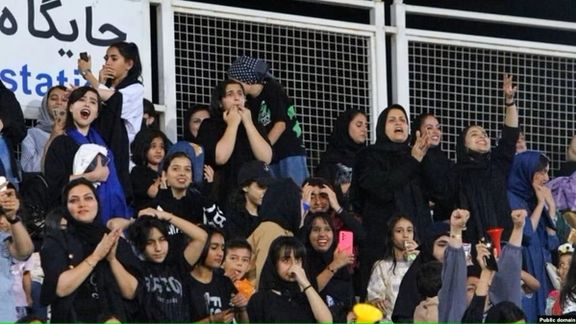
Prompted by stern warnings from FIFA and the Asian Football Confederation (AFC), Iran has reluctantly permitted women to attend a football match outside Tehran.
On Wednesday, women were part of a crowd of local spectators cheering on their teams at a football (soccer) match at Sirjan Stadium in Kerman Province between the city's team and Khuzestan's Foulad FC. It was the first time in 44 years that women have been allowed to attend a football match outside of the capital city.
Just days prior, FIFA and the AFC had expressed serious reservations about Iran's persistent exclusion of women from attending football matches. Permitting women to enter the stadium in Sirjan could have been in response to the mounting international pressure, Shargh daily in Tehran reported.
Although the presence of women at the Sirjan Stadium was extensively promoted through local media, the Iranian press opted to restrict coverage, releasing only a handful of photographs to the public. Notably, several attending women were observed without the mandatory hijab.
It is still not clear if the development in Sirjan is a lasting policy change by the Islamic Republic. Women’s presence in stadiums outside of Tehran has become a controversial issue in recent years. FIFA have been calling for women's entry into stadiums for years, but Iran's Football Federation and other relevant entities had persistently delayed its full implementation.
The Iranian regime's handling of women's participation in football matches has remained under global scrutiny. While there were some limited concessions granted last year, allowing women a controlled entry, the government's reaction to nationwide protests eventually resulted in the revocation of this privilege, leading to months of matches conducted without spectators.
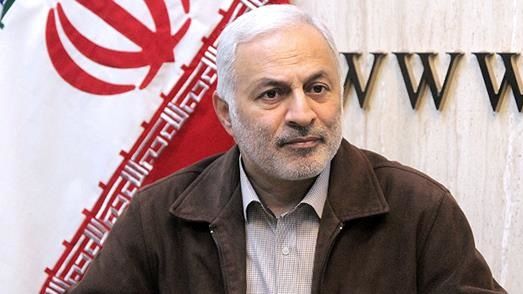
A senior parliamentarian has assured Iran's commitment to stand by Syria's side, both in its “ongoing battles and economic endeavors”.
During a visit to Damascus, Vahid Jalalzadeh, the head of Iran's parliamentary national security and foreign policy commission, conveyed the message that Iran's support to Syria extends beyond military aid.
"Just as we have been with the Syrian government and people in the war with terrorists, we will also be with them in the economic war," Jalalzadeh said during his visit. He also emphasized Iran's stance against foreign presence on Syrian soil, rejecting any foreign intervention, “be it Turkish or American.”
Arriving in Syria on Monday with a delegation for a three-day visit, Jalalzadeh held discussions with Prime Minister Hussein Arnous and Syrian Foreign Minister Faisal Mekdad.
The extent of Iran's military expenditures in support of Syria's President Bashar al-Assad remains undisclosed. While initial estimates placed the support between $20 billion and $30 billion, evidence of Iran's increasing industrial capabilities suggests the true figure could be significantly higher. Leaked documents from Iran's foreign ministry reveal that Syria's debt to Iran has reached $50 billion, stemming from a long-term agreement signed in January 2019.
Many Iranians have raised discontent with their government's regional policies and its financial aid to militant groups, particularly in light of domestic economic challenges. Inflation exceeding 50 percent and a devalued national currency have led to widespread economic hardship, with nearly half the population living below the poverty line.
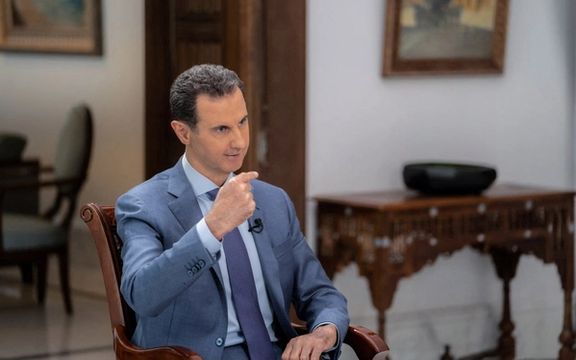
In a bizarre claim, Syria’s dictator president, Bashar Assad, says that the support of Iran and Russia has had an important effect on the stability of Syria.
Speaking in a rare interview with Sky News, Assad claimed "the close relations between Syria and Russia and Iran prove that Damascus knows how to choose its friends.,” highlighting the brutal force the three governments employed to crush dissent during the civil war.
The war, which broke out in 2011, rages on with the UN estimating that more than 300,000 civilians were killed in the first decade of the conflict.
During its 12 years, the war has forced more than half of the country's 22 million pre-war population to flee their homes with the civil war a major factor in Europe's migrant crisis.
The governments of Canada and the Netherlands recently filed torture complaints against Syria in the International Court of Justice over the "unlawful killing" of thousands of civilians.
Assad added: “The support of our friends had an important impact on the stability of Syria. The support of Iran and Russia helped Syria to resist the crisis that engulfed the country.”
Syria is far from stable continues to be hugely swayed by both Moscow and Tehran, whose own relationship has also been challenged by the desire to gain a greater foothold in Syria, Iran’s presence only putting Russia’s own troops at risk from Israel attacks as the shadow war between Iran and Israel continues with a major focus on Syria.
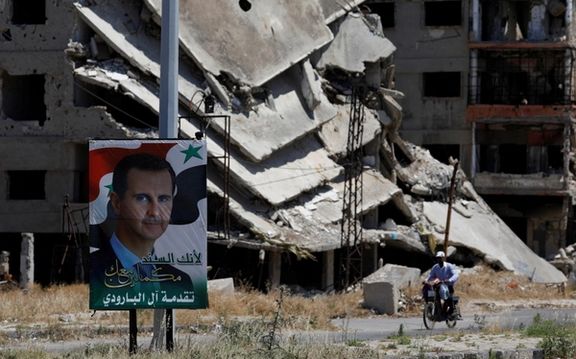
Just last week, Iran International reported on new research by Israel’s Alma research institute which shows Iran’s investment into weapons plants in Syria continues, at the expense of the Iranian people suffering the worst economic crisis in decades.
The Alma report claimed: “Iran’s major focus is to develop and manufacture precision missiles and rockets, cruise missiles, and unmanned aerial vehicles (UAVs) on Syrian soil”.
Assad did not refer to the ongoing strengthening of Iran’s proxies on its doorstep, nor the permanent presence of IRGC and Quds forces on Syrian soil during his interview.
This month marks 10 years since then President Obama decided not to bomb Syria after chemical weapons were used against civilians in rebel-held areas. President Assad has now regained control of the capital Damascus and most urban areas.
“We knew from the beginning of the war that this war would be long. It will be and it won't be a temporary crisis - as some thought - but no, no one could have predicted the details,” he told Sky News, seemingly unconcerned that the country has reached the depths of despair, compounded by last year’s tragic earthquake which left over 8,000 civilians dead.
Moving the blame away from his tyrannical regime, Assad pointed the finger at “terrorism” for the country’s destruction. “If we assume that it was the government that started killing and displacing people, then the government is responsible, but terrorism existed and the government was fighting terrorism, it was terrorism that killed, destroyed and burned.,” he claimed.
Soon after anti-regime protests started in early 2011, Assad’s government resorted to use of military force against protesters with Iran’s backing.
The World Bank’s latest report asserts that “although large-scale armed conflict has subsided, Syria continues to rank among the top countries in terms of violent deaths”, noting that “multiple domestic and external shocks are adversely affecting the economy”.
In 2020, it was revealed by a prominent lawmaker that Iran had spent between $20 billion and $30 billion in Syria to prop up President Bashar al-Assad and fight Islamic State but as revelations of Iran’s growing industrial capabilities continue, the true number is believed to be far higher.
“We have probably paid $20-30 billion to Syria, and we have to take that money back,” Heshmatollah Falahatpisheh, a member of the Iranian parliament's national security committee, said in an interview with Etemad Online at the time. Little has changed since, regime activities in Syria seeming to only step up, not down.
In May, Iran International reported that based on leaked documents from the Iranian foreign ministry, that Syria owes Iran $50 billion. Iranians often express strong disapproval of the regime’s regional policy of establishing and supporting militant groups and its involvement in Syria, while inflation has surpassed 50 percent in Iran. Iran’s national currency has fallen 12-fold in the past five years and nearly half of the population lives below the poverty line.
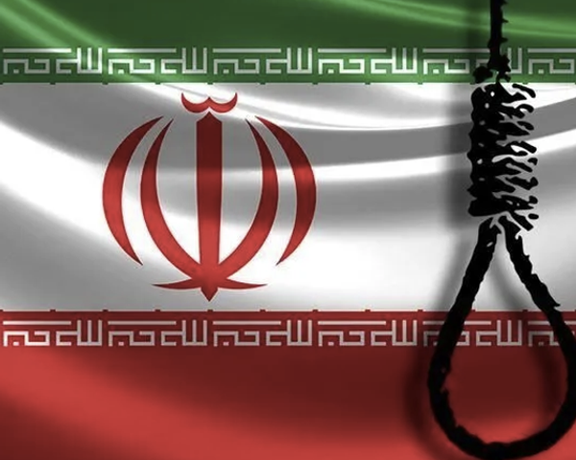
Human rights organizations have raised alarm over more executions in Iran, with at least nine individuals hanged in the past two days alone.
Four prisoners were executed for alleged drug-related crimes, while five men from Marand faced execution on charges of rape. The situation has garnered international attention as concerns mount over the Iranian government's capital punishment practices.
On Wednesday, Manouchehar Khazaei, a former member of the police force, was executed in Hamedan for drug-related offenses. Additionally, Hossein Nasiriyan and Hasan-Ali Shakib were hanged on Tuesday in Shiraz Central Prison, both on drug-related charges. Another prisoner, Ahad Hashemi, was executed in Hamadan prison on Wednesday after spending seven years in jail for drug crimes.
Meanwhile, the execution of five men from the northwestern city of Marand for alleged rape was carried out on Wednesday, though the identities of the executed individuals have not been disclosed by Iranian authorities or media.
The human rights organization Hengaw has further expressed concern regarding potential death sentences for four protesters from Sanandaj, accused of "moharebe" or "war against God" during the revolutionary uprising.
These executions coincide with a recent report from the United Nations High Commissioner for Human Rights, highlighting a distressing trend of increased capital punishment in Iran. The report revealed that in 2022, 582 individuals were executed—a staggering 75% rise compared to the previous year's figure of 333. Notably, this included the execution of three juveniles.
In 2023, alarming parallels persist, with 94 executions recorded in January and February alone. The report also highlights the execution of several individuals allegedly involved in nationwide protests.